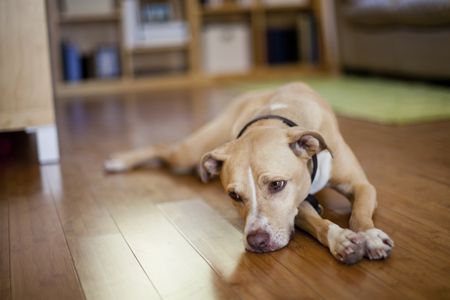If you have a dog whose behavior has changed for non-medical reasons, they may be experiencing depression. The following article discusses how you can recognize it and what you can do to correct it.
While dogs don’t really ruminate on negative topics in the way that humans do, they do occasionally feel sad, and even experience depression. Here are a few reasons why your dog may be depressed.
- There has been a change in routine.
- There is a change in living space.
- Your dog has lost a companion.
- Your dog is being annoyed/bullied by another member of the household.
Depression symptoms in dogs are quite similar to those in humans. Here are the signs, and how you can address different depression triggers.
- Your dog’s appetite is reduced. All dogs enjoy their food, but if your dog has stopped eating, that is a sign that something is seriously wrong. If your dog shows any change in appetite, they should be examined by the vet as soon as possible.
- Your dog is no longer interested in physical exercise, play, or walks. Like a change in eating behaviors, lethargy can be a sign of either psychological distress or physical illness. Have your dog checked by a vet if they can’t be tempted away from their bed.
- Your dog becomes snappish, and is unpredictably irritable. Sudden outbursts of aggression from an otherwise mild-mannered pet can be a sign of depression.
If, after a thorough examination, your vet finds that there are no medical issues causing the change in behavior, you must find and correct the source of your dog’s despair. Fortunately, while humans can suffer from clinical depression that stems from brain chemistry and not outside events, dogs become depressed due to environmental changes, so you should be able to address the root cause effectively.
Your dog has lost a companion
When an owner or a friend leaves or dies, dogs can experience significantly depressed mood. Although they will continue to miss their friend, it’s important to maintain a strict schedule of activities so that the dog doesn’t continue to feel an active sense of loss. Even if your dog doesn’t much feel like going for walks, it’s important that they continue to get plenty of exercise. Because dogs thrive when they are given routines, do your best to stick to the same daily regimen. If you have a piece of clothing or an item (that is safe for dogs) with the absent companion’s scent, you might put it in your dog’s bed.
You move to a new home
For a dog, moving to a new home can be chaotic. They may not feel as though this new home is their lair and are unsure what their role is anymore. Again, routine is important. Keep a mealtime, walk, play, and activity schedule after the transition.
Your dog doesn’t get along with another household pet or person
Sometimes, pets just don’t get along. If you have a dog who is struggling to cope with another pet whose behaviors intimidate or irritate them, consult a professional trainer who specializes in socialization so that their behaviors can be modified. If your pet doesn’t like the attentions of a child, make it clear that the way they interact with the dog is causing distress.
Poor nutrition can make a dog more vulnerable to lethargy and illness. Some of the best and most affordable products include Nutrish, Blue Buffalo, and Zignature dog food. DCM obesity are serious conditions that can be managed with the right diet.
To read more on topics like this, check out the health category.

Leave a Reply